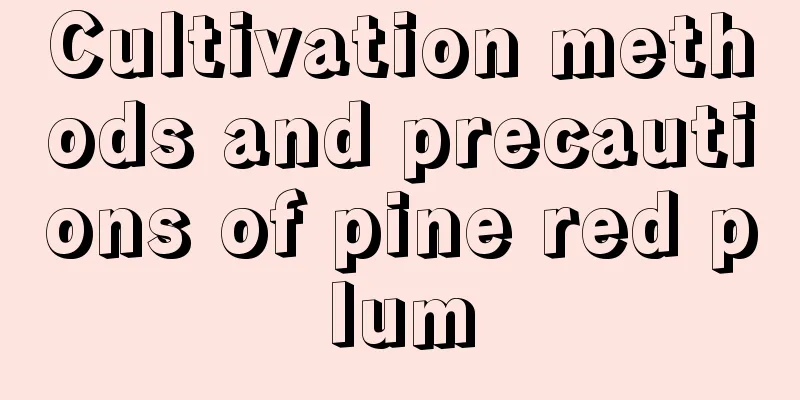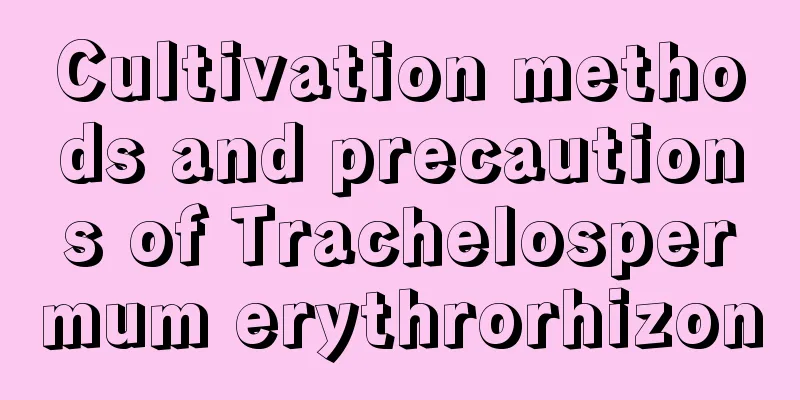Cultivation methods and precautions of pine red plum

Farming methodssoilThe soil requirements of pine red plum are not very strict, but it grows best in slightly acidic soil that is rich in humus, loose, fertile, and well-drained. WateringPine red plum likes a humid environment and can also tolerate drought. For normal maintenance, just keep the soil moist. During the rainy season, pay attention to drainage to avoid waterlogging in the soil. temperaturePine Red Plum likes a cool, humid and sunny environment. The suitable growth temperature is 18℃-25℃, and the temperature must be kept above -1℃ in winter. FertilizationDuring the growing period of pine red plum, apply decomposed thin liquid fertilizer once every 1 to 2 months. illuminationPine red plum is afraid of high temperature and scorching sun, so except for the summer when it needs to be placed in a shade shed, under the shade of a tree or in a cool and ventilated place for maintenance, it should be given sufficient sunlight in other seasons. PrecautionsControl moisture in winterPay attention to the number of watering in winter, keep the soil slightly moist and slightly dry, not too wet. Keep warm in winterIn winter, it needs to be kept warm and can be planted on the south side of the building for microclimate protection. In terms of terrain selection, high slopes, high platforms with smooth drainage are preferred, and depressions should be avoided. In the northern winter, it is best to choose indoor potted plants for maintenance. Controlling Soil pHWhen the soil is too alkaline, use 5% ferrous sulfate solution to improve it, and the pH value should be between 6.5 and 7.0. Prune at the right timeCareful pruning is done once a year after flowering to dwarf the crown, maintain a beautiful tree shape, and encourage the plant to sprout new flowering branches. When pruning, you need to pay attention that except for some branches that affect the plant shape, other branches should not be pruned away completely. Generally, pruned half or two-thirds of them are sufficient. |
<<: How to cultivate Alpinia serrulata at home
>>: Lotus bamboo cultivation methods and precautions
Recommend
Cultivation methods and precautions of succulent Tangyin (Care methods of Tangyin plants)
As a succulent plant, Tangyin is different from m...
Time and method of changing soil in red nanmu
Time to change the soil It is best to change the ...
The flowers I have been growing for 10 years suddenly died? Do this quickly and you may be able to save your life!
Gardenia reason: In summer, gardenia is most like...
Can vinca roseus be grown indoors?
1. It can be raised indoors It can be kept indoor...
When is the best time to sow the dancing spring flowers?
Suitable time for sowing spring flowers Dancing S...
Cultivation methods and precautions of aster
1. Watering Aster likes to grow in a relatively h...
Steps and methods of growing garlic Garlic planting technology and management methods
The Yellow River Basin is a suitable area for gar...
When is the right time to sow cabbage?
Suitable time for sowing cabbage Cabbage, also kn...
What fertilizer is good for money tree
1. Is there a high demand for fertilizer? In gene...
How to cut Magic Fountain Clematis
1. Pruning time The pruning time and emphasis are...
Is golden chrysanthemum poisonous?
1. Is it toxic? Golden chrysanthemum is non-toxic...
How to divide aloe vera
1. Remove from the basin Do not water the aloe ve...
Eight tips for raising pigs in winter
The colder weather is also a challenge for farmer...
How to plant cockscomb and what are the planting time and methods
Cockscomb planting time Cockscomb is planted in A...
A complete list of common succulent varieties suitable for cultivation in the north!
Qingshengjin Qingsheng Jin can grow normally in a...









